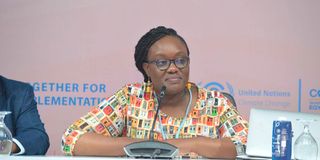Kenya signs carbon trading deal with Sweden in climate finance breakthrough

Ms Pacifica Ogolla, the director of Climate Change at the Ministry of Environment and Forestry. She is leading the Kenya delegation to the UN climate negotiations in Bonn, Germany.
In Bonn, Germany
Kenya has signed a landmark emissions trading agreement with Sweden under Article 6 of the Paris Agreement, marking a significant milestone in the country’s efforts to finance its climate transition through international cooperation. The deal, struck on the sidelines of the ongoing UN climate negotiations in Bonn, is Sweden’s fourth such bilateral pact and a notable endorsement of Kenya’s progressive environmental policies.
The agreement, finalised between Kenya’s Ministry of Environment, Climate Change and Forestry, and the Swedish Energy Agency, follows nearly a year of negotiations and is seen as a breakthrough for Kenya’s participation in the rapidly evolving global carbon market.
According to the Swedish agency, the next phase will involve developing actual emissions reduction projects, though specific project types were not disclosed.
Dr Pacifica Ogolla, who is leading the Kenya delegation to the Bonn summit, hailed the deal as “a fitting example of Kenya’s commitment and leadership on climate action”.
“Our long discussions have finally borne fruit,” she told the Nation in an exclusive interview on the sidelines of the summit. “Coming soon after a similar deal with Switzerland, it points to our resolve to pursue multilateral solutions for our people, and we see a great future in carbon markets.”
Dr Ogolla hinted that the next big signing could be with the small-but-rich Asian nation of Singapore, and that the government aims to strike a deal before the end of the year.
Article 6 of the Paris Agreement enables countries to cooperate voluntarily in achieving their climate targets by trading carbon credits, provided such arrangements ensure “real, measurable and long-term” emissions reductions. With many developed countries, including Sweden, under pressure to meet their net-zero targets, such bilateral agreements are becoming critical in financing green projects in developing nations.
They, however, face opposition from civil society activists, who see them as “pollution permits” for wealthy nations to exploit their poor counterparts. In Bonn, activists have also claimed that this new era of “extractivism” risks placing undue burdens on communities fighting to adapt to climatic crises.
But, speaking after the signing of the deal with Kenya, Ms Caroline Vicini, Sweden’s ambassador to Kenya, said the country’s ambition and policy leadership in the climate space were commendable.
“Kenya pursues progressive environmental policies and has set ambitious climate goals but needs financial support to accelerate its climate transition,” she said. “There are great opportunities for Sweden to contribute here.”
The agreement places Kenya alongside other countries that have signed Article 6 deals with Sweden, including Ghana, Zambia, and Nepal. Sweden has also entered Memorandums of Understanding with the Dominican Republic, Rwanda, and Switzerland, pointing to an emerging network of South–North climate cooperation arrangements.
The deal with Kenya comes amid major shifts in the carbon trading landscape. Last year, negotiators agreed on the detailed rules governing carbon markets under the Paris Agreement, turning Article 6.2 into what some are calling a “buyer’s market”.
With those rules now in place, countries like Kenya, which can demonstrate clear mitigation potential, are well positioned to attract buyers. But this isn’t a blank cheque, as Mr David Newell, senior policy advisor at the Swedish Energy Agency, explained, noting that host countries must offer credible and conditional mitigation contributions, known in climate jargon as Nationally Determined Contributions (NDCs).
“If it’s too ambitious, pretty much anything we do in Article 6 is going to be making it harder for them to achieve their NDC,” Newell said. “If it’s not ambitious enough, then they’re simply selling projects that are basically business-as-usual, or worse.” Sweden, he added, is therefore evaluating each country’s NDC with a fine-tooth comb.
So, what’s in it for Kenya? The short answer is: climate finance and technical know-how. The longer answer lies in the potential to use this deal as a blueprint for developing a robust pipeline of mitigation projects across sectors such as renewable energy, reforestation, sustainable agriculture, and clean cooking. These are all areas where Kenya has existing capabilities, but lacks sufficient funding to scale.
While the precise structure of the Kenya–Sweden agreement remains under wraps, such bilateral agreements typically involve results-based payments. Kenya will also need to make what is known as a “corresponding adjustment” to its own carbon accounting, ensuring that reductions sold to Sweden are not double-counted. This requires strong institutional systems and transparency, and while the Ministry of Environment has made progress in this regard, it still faces challenges in cross-sector monitoring.


